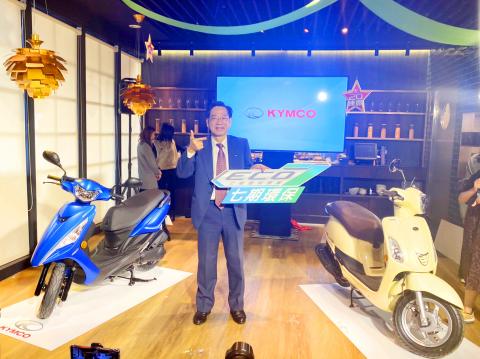Kwang Yang Motor Co (光陽工業), the nation’s largest manufacturer of gasoline-powered scooters, plans to defend its market position next year by rolling out 15 new gasoline-powered scooter models that meet the government’s Phase 7 emissions standards.
To cope with stringent emissions requirements, the company yesterday launched two scooters that it says produce 96 percent less greenhouse gas emissions than scooters that meet the Phase 6 emissions standards.
The older-generation scooters would be phased out, the company said.

Photo: CNA
The Kaohsiung-based company said that local scooter makers are gearing up to launch new low-emission models after the Environmental Protection Administration (EPA) in October introduced the new scooter emissions law to reduce air pollution, which is to go into effect next year, one year earlier than originally scheduled.
The EPA plans to subsidize purchases of fuel-powered scooters that meet the new emissions standards for two years, beginning next year.
People would receive NT$5,000 each for retiring their heavy scooters, or NT$3,000 for light models.
“We will roll out 15 new models gradually that meet Phase 7 emissions standards next year,” Kwang Yang chief executive officer Ko Chun-ping (柯俊斌) told reporters at a year-end media gathering in Taipei.
Sanyang Motor Co (三陽), the No. 3 scooter maker in Taiwan, also plans to launch seven new scooters that meet the Phase 7 standards.
Three of them are to hit the market next month, the company said in a statement yesterday.
Regarding the outlook for the local scooter market next year, Ko maintained a conservative attitude.
“The scooter market will see a volatile year in 2020, as the government’s policies will greatly affect consumers’ behavior,” he said.
Ko said he expects the nation’s scooter sales to shrink 1.16 percent to 855,000 units next year from an estimate of 865,000 units for this year.
Electric scooters are expected to comprise 13.5 percent of the nation’s overall scooter market next year compared with 17.5 percent this year, as a result of government subsidy cuts, he said.
Since early this year, Ko has been calling on the government to scrap the commodity tax on gasoline-powered scooters so that companies can fairly compete with electric scooter manufacturers, rather than just lowering the tax by NT$4,000 per vehicle to replace an old one.
The government levies a 17 percent commodity tax on the retail price of gasoline-powered scooters, but not on electric scooters.
Kwang Yang plans to launch three or four electric scooters next year, Ko said.
The company operates 550 recharge stations where riders can recharge their electric scooters or swap empty batteries for fully charged ones, he said.
Kwang Yang sold 266,394 own-brand scooters, including 8,506 electric models, in the first 11 months of this year, seizing a 33.5 percent share of the market, Ko said.

POWERING UP: PSUs for AI servers made up about 50% of Delta’s total server PSU revenue during the first three quarters of last year, the company said Power supply and electronic components maker Delta Electronics Inc (台達電) reported record-high revenue of NT$161.61 billion (US$5.11 billion) for last quarter and said it remains positive about this quarter. Last quarter’s figure was up 7.6 percent from the previous quarter and 41.51 percent higher than a year earlier, and largely in line with Yuanta Securities Investment Consulting Co’s (元大投顧) forecast of NT$160 billion. Delta’s annual revenue last year rose 31.76 percent year-on-year to NT$554.89 billion, also a record high for the company. Its strong performance reflected continued demand for high-performance power solutions and advanced liquid-cooling products used in artificial intelligence (AI) data centers,

SIZE MATTERS: TSMC started phasing out 8-inch wafer production last year, while Samsung is more aggressively retiring 8-inch capacity, TrendForce said Chipmakers are expected to raise prices of 8-inch wafers by up to 20 percent this year on concern over supply constraints as major contract chipmakers Taiwan Semiconductor Manufacturing Co (TSMC, 台積電) and Samsung Electronics Co gradually retire less advanced wafer capacity, TrendForce Corp (集邦科技) said yesterday. It is the first significant across-the-board price hike since a global semiconductor correction in 2023, the Taipei-based market researcher said in a report. Global 8-inch wafer capacity slid 0.3 percent year-on-year last year, although 8-inch wafer prices still hovered at relatively stable levels throughout the year, TrendForce said. The downward trend is expected to continue this year,

A proposed billionaires’ tax in California has ignited a political uproar in Silicon Valley, with tech titans threatening to leave the state while California Governor Gavin Newsom of the Democratic Party maneuvers to defeat a levy that he fears would lead to an exodus of wealth. A technology mecca, California has more billionaires than any other US state — a few hundred, by some estimates. About half its personal income tax revenue, a financial backbone in the nearly US$350 billion budget, comes from the top 1 percent of earners. A large healthcare union is attempting to place a proposal before

Vincent Wei led fellow Singaporean farmers around an empty Malaysian plot, laying out plans for a greenhouse and rows of leafy vegetables. What he pitched was not just space for crops, but a lifeline for growers struggling to make ends meet in a city-state with high prices and little vacant land. The future agriculture hub is part of a joint special economic zone launched last year by the two neighbors, expected to cost US$123 million and produce 10,000 tonnes of fresh produce annually. It is attracting Singaporean farmers with promises of cheaper land, labor and energy just over the border.